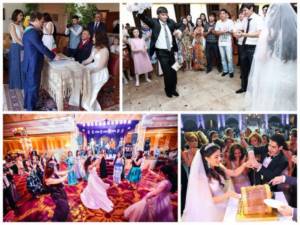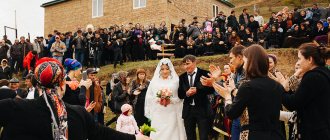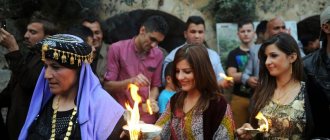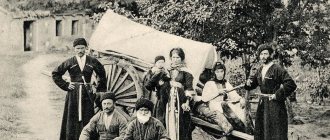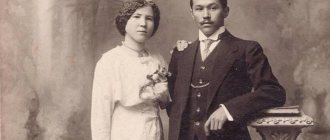Since ancient times, marriage and the creation of a family in all countries have been considered the most important event in a person’s life, because it marked a transition to a new status and the imminent birth of offspring. Azerbaijan is no exception, and the attitude towards marriage here is serious. An Azerbaijani wedding is a huge celebration. Before it begins, during and after the celebration, many rituals, ceremonies are performed, and customs are taken into account. A large number of people take part in the process of organizing and holding the celebration - from close relatives to neighbors.
Choosing a future bride
Azerbaijani girls are taught to be modest from childhood, they spend a lot of time with their friends and avoid male companies. Even now, when young people have become more free in choosing their soulmate, it is mostly done by a man, because not all Azerbaijani brides have close contact with their grooms before the wedding. After choosing a girl, the groom asks the parents for permission. As a rule, they support their son, but their refusal often becomes a reason for the young man to change his decision.
Then comes the stage of the so-called message. How this happens: to begin with, the man chooses an intermediary - a close relative, she is engaged in finding out the girl’s financial situation, the status of her parents in society. She also determines whether the Azerbaijani groom is able to make a worthy match for her, because if he is not wealthy enough to provide for the family, the bride’s parents may not agree to the marriage even at the stage of small matchmaking. The relative also learns about the girl’s economics, her health, and education.
The age of the future Azerbaijani bride practically does not matter - according to Muslim traditions, a young girl can be matched even at 14-15 years old. After the groom has decided on a suitable bride, his parents send the same intermediary or another person from the closest relatives to inform the girl’s father and mother about the young groom’s intentions. If they agree, a date for the upcoming matchmaking is set.
Two stages of matchmaking

When the groom has chosen a bride, his parents send one of their relatives to the house of the chosen one’s parents. If they agree, then matchmaking will soon take place. Azerbaijani matchmaking takes place in two stages. The first is called small, the second – large. The small matchmaking of an Azerbaijani bride begins with a conversation between the groom’s father and the family. Everyone's opinion matters. Then matchmakers are sent to the bride's house. Usually, the groom’s mother and one of his other relatives come to small matchmaking in Azerbaijani style.
Afterwards the fathers meet. The guy's father comes with three men. These are either relatives or other respected people. He says that his son wants to marry their daughter. It is customary for the girl’s father to refuse him and say that he needs to find out the opinion of the girl herself. The daughter must remain silent - then this will mean that she has agreed to become a bride. After this, the matchmakers leave.
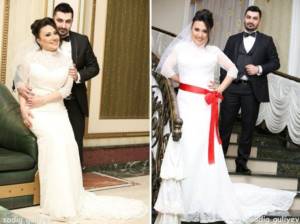
The big matchmaking of an Azerbaijani bride begins with the head of the groom’s family discussing the upcoming wedding with his relatives. The women of this family, in turn, go to the bride and find out her opinion. Next, the women set a day for the matchmakers to arrive. On the day of matchmaking, envoys arrive and are given a place of honor at the head of the table. The bride herself is absent from the event, walking with her mother. Meanwhile, relatives and matchmakers are talking. If relatives agree to the marriage, then they take time to think. In this case, the matchmakers will come again.
The second visit of the matchmakers looks more festive - guests are called, tables are set. The girl's mother stays at home, but she must remain silent. The girl is sitting with a friend at this time. On the second visit to the matchmakers, the bride's father blesses the couple. While the guests are drinking tea, the bride's sister runs to her to congratulate her. The girl returns from her friend when the guests have already left. It is considered a good omen if the bride cries that evening.
Matchmaking
In Azerbaijan, matchmaking before a wedding takes place in two stages:
- Small matchmaking.
After receiving the answer, the groom's father communicates with the family to find out their opinion about the Azerbaijani girl and the upcoming wedding - every word has weight. When the discussions are over, the family of the Azerbaijani groom sends matchmakers to the house of the future wife. As a rule, the first to come to small matchmaking are the women of the groom's family - the mother and another close relative (the mother's sister, her eldest daughter). This is due to the belief that only a mother can truly understand a girl’s heart.
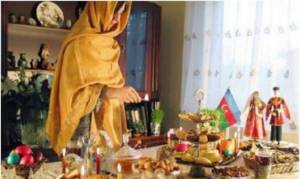
When the female heads of families have decided to continue the event, the fathers meet. The groom's father comes along with three other Azerbaijani men - these can be close relatives (brother, father) or respected people of the city or village. He announces his son's intention to marry the young bride. At first, the girl’s father refuses with the words: “I need to know my daughter’s opinion.” When asked about the upcoming wedding, the girl remains silent, which means her consent.
The matchmakers leave the house, and the final decision awaits them during the big matchmaking.
- Big matchmaking.
When the stage of small Azerbaijani matchmaking has been completed, the head of the groom’s family invites close relatives to discuss the upcoming event. The female half of the young man’s family goes to the bride to find out her opinion about the future wedding. When the bride's answers are received, the women set a day for the matchmakers to arrive. Time passes, the date of matchmaking arrives, the envoys arrive, they are seated at the head of the table.
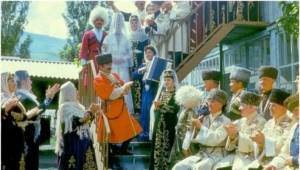
Many of the girl’s relatives are present at the matchmaking ceremony, except for her mother, who spends time with her daughter on a walk so as not to be at home at this time. After discussing extraneous things - the harvest, the weather, politics, other news - the relatives-matchmakers ask the main question: “Will you give us a beautiful girl?” If an Azerbaijani family decides not to marry off their daughter, they refuse. If the relatives agree, they ask the matchmakers for time to think - this means that they will come a second time.
The family of the Azerbaijani bride invites many guests for the second visit of the envoys, sets the table, this time the bride’s mother is present during the matchmaking, but does not say a word. Relatives and matchmakers come again, they are well received and always treated to food. There is communication on abstract topics. After some time, one of the groom’s matchmakers asks the question: “What will you say this time?” On the second visit, they rarely refuse, so, as a rule, the bride’s father says: “May Allah bless them!”

Guests are served sweet tea, and the future wife’s sister, after the matchmaking is over, runs to congratulate the Azerbaijani bride (she is waiting for her friend’s decision). When the big matchmaking stage is over and the guests have gone home, the girl returns home and is congratulated on her imminent wedding by her closest relatives - parents, brothers, sisters. On this day, during congratulations to the hero of the occasion, it is customary to cry.
Engagement ceremony
The engagement ceremony also takes place in two stages:
- Small engagement.
- Big engagement.
The groom himself and his friends come to the small engagement party. The bride is in the company of two or three dozen friends. The groom's official representative puts the ring on the girl's finger, and he also covers the girl's head with a scarf.
Then he must eat half of any sweet served by the bride, and give the other half to the groom.
As soon as the ceremony is over, the bachelorette party begins, the girl’s friends shower her with congratulations and parting words, sitting at the sweet festive table. The small engagement takes place within a month after the matchmaking.
A couple of months later there is a big engagement party. This big event requires careful preparation, and not only relatives, but also friends and neighbors are invited to it. The groom's relatives can also provide the necessary food for the table. Only onions are not sent, being considered a bad omen symbolizing bitterness in family life.
Various necessary things are presented to the bride as gifts:
- Cloth;
- Decorations;
- Money;
- Dishes;
- Other utensils.
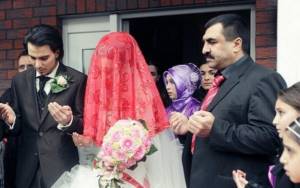
Gifts are usually given on silver trays if they are small. When large gifts are given, they are placed in chests and tied with a red ribbon.
The only gifts not given from relatives are shoes, which are later presented by the mother-in-law personally.
Small and large engagement
Like matchmaking, the betrothal of young people before a wedding in Azerbaijan takes place in two stages.
- Small engagement.
This stage of pre-wedding preparation is carried out within a month after the consent of the father and mother of the bride to hold the wedding. Close relatives of the groom visit the house of the future wife to conduct a small engagement ceremony. The girl herself sits surrounded by 20-30 people (these are her friends the same age). One of the messengers bears the responsibility of putting a ring on the beauty’s finger, covering her head with a scarf, and then tasting at least a small piece of some sweetness.
The other half of the Azerbaijani sweet, from which the envoy took a bite, is given to the future spouse. When the groom’s relatives leave, the table is set with sweets, which constantly appear during an Azerbaijani wedding - it is generally believed that they ensure future family abundance and fertility. When all the guests, as well as the bridesmaids, have eaten, the bachelorette party begins.
It is interesting because of the ancient Azerbaijani ritual: the bride takes turns placing her hand on the heads of unmarried girls, who try on her ring. It was believed that the first one to try on the ring of the future wife would soon celebrate the wedding herself. After the bachelorette party, the bride's friends performed another Azerbaijani ritual: they placed two identical sweets under their pillow to see their lover in a dream.

- Big engagement.
A few months after the small betrothal, the second stage of the Azerbaijani custom takes place. This is a real holiday for which both sides are seriously preparing. The family of the future wife prepares the festive table, although often all kinds of products for it (for example, meat, flour, vegetables, sweets, alcohol) are sent by the groom's family. It is not customary to send only onions, because they have long been considered a harbinger of bitterness in life together after marriage.
During a big engagement, many guests are present - from the closest relatives to neighbors. This is due to the fact that Azerbaijani marriage is built not only on the love of young people, but also on the approval of society. Society became an important witness in preparation for the wedding; it was previously believed that this would make the marriage bond even stronger.
On the day of the engagement, the relatives of the hero of the future celebration had to bring everything necessary for the bride’s happy life - they did not give only shoes, which later, after a certain amount of time, were brought by the mother-in-law. Large gifts were packed in chests tied with red ribbons, small ones were placed on copper trays covered with multi-colored blankets. Such trays were called khoncha and were an obligatory part of the action in ancient times, and they are still used in our time. Wealthy families often invited musicians to accompany the offering of these gifts.
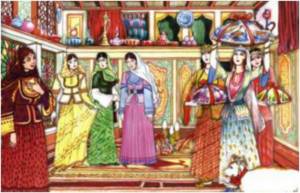
Examples of gifts that were brought to the Azerbaijani bride:
- cuts for dresses
- colored scarves
- decorations
- stockings
- sweets
After presenting the gifts, a wedding ring was placed on the future wife's finger. Then both families sat down at the table to discuss the amount of the bride price. An important aspect of the ransom amount was determined by the well-being of the girl, her economy, and the respect of society for her family - the money received during the ransom was used to pay for the wedding expenses, and they were also used to purchase a dowry.
Traditionally, in addition to the ransom or instead of it, a wedding contract was concluded, which guaranteed the bride a monetary reward if the husband decided to divorce her. After the engagement and until the wedding itself, varying amounts of time passed - from several months to several years. The girl spent all this time at home, and the groom’s family continued to send her gifts - various clothes, items to decorate and make life easier, fresh fruits, sweets. During the festival of sacrifice, a live bull served as a gift.
After the engagement day ended, the Azerbaijani relatives of the hero of the occasion gathered around the bride, looked at the gifts, and congratulated the girl on her imminent wedding.

Some time after the big betrothal, the bride's family comes into play: they send gifts to the future husband on the same copper trays. The first is intended for the groom, the second with gifts for men, the third for women, the rest are generously filled with sweets and fruits. This time the table is set by the other side, although a much smaller number of guests gather. After a small feast, the bride’s relative tells who the tray is intended for, the mother of the future spouse thanks her, and the guests leave.
Preparation for engagement and ceremony
Despite the displacement of a number of traditions, betrothal remains a ritual that has not changed in the country even after several hundred years. Like matchmaking, the betrothal ceremony includes two main stages.
The stage of the Small Betrothal begins after the groom's side receives the consent of the bride's parents for the marriage. Usually it does not take more than a month. To do this, relatives from the groom’s side must come to the young bride’s house. The lady at this time should be accompanied by a large number of friends.
The task of one of the ambassadors is engagement, that is, he must put a ring on the bride’s finger and cover her head with a special scarf. After which he is offered to eat a sweet, of which he must bite off half. The second, according to tradition, is delivered by the ambassador to the groom after the ritual is performed.
After the ambassadors leave, the housewives must set a sweet table, symbolizing the happiness and prosperity of the young family. The bride must then perform the bridal shower ceremony. She touches her hand to the head of each friend, and she, in turn, must try on her wedding ring. According to the superstition, the first one whose head the bride touches will soon get married. You can also see your betrothed thanks to a simple ritual: you had to put some sweet pastries under the pillow.
The Big Betrothal stage in the country begins a few months after the first, Small stage. Preparations for the event include preparing a sumptuous table and the help of relatives from the groom is not excluded. At this stage, it is customary to invite many guests, and not only relatives, but also neighbors, as well as distant friends.
The groom's friends gave gifts to the young bride, mainly those that could be useful to her in her new family. Only shoes were usually not given as a gift, since a little later this ritual was performed by the mother-in-law. Smaller gifts were placed on a special tray, which was covered with a special colorful cloth. Often the offering of gifts was accompanied by music. After which the ring was put back on the girl’s finger, and then a discussion followed about the size of the possible ransom. The money raised after the ceremony was spent on wedding preparations and the formation of a dowry.
A wedding in Azerbaijan requires the existence of a certain agreement if both families wish. According to it, the bride is entitled to an agreed amount of money in the event of a divorce from her husband in the future. From the engagement stage to the wedding celebration itself, it could take either a couple of months or several years. At the same time, the bride sat at home while waiting, and the groom’s relatives had to give her various necessary gifts, ranging from clothes to fruits. On the day of sacrifice, a bull was considered an ideal gift.
After the Big Betrothal stage, gifts to the groom's family must be given by the other party. The trick is to send gifts on the same trays on which the young woman previously received gifts. Gifts are distributed as follows.
- The first gift is intended for the groom himself.
- The second one is sent for men of the family circle.
- The third is for the ladies of the groom's family.
Other trays are designed to be filled with sweets and other nice little things. Now the responsibilities for collecting the festive table lie on the other side. But in this case the number of guests is expected to be smaller.
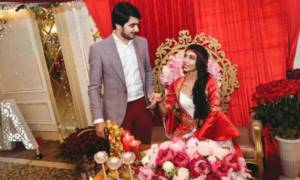
Pre-wedding chores
Everyone carefully prepares for the Azerbaijani celebration, because a wedding unites the souls of two lovers. A lot of pre-wedding troubles await families on both sides. Before the event, a “conversation” is required, the date of which is set by the head of the groom’s family. The two male parties (close relatives of the young man and the girl getting married) agree among themselves, choose the wedding day, which, according to legends, will be the most favorable for starting a family, decide the details of the Azerbaijani celebration - musical accompaniment of the celebration, number of guests, menu.
Basically, wedding expenses go to the relatives of the Azerbaijani groom, but it often happens that the bride’s family refuses this, placing the entire wedding on themselves. After reaching an agreement, the participants in the “conversation” disperse, wishing each other well and happiness.
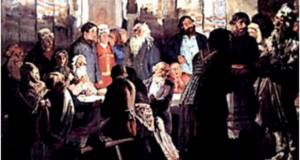
Bride's outfit for an Azerbaijani wedding
Like any newlyweds, the bride and groom at an Azerbaijani wedding dream of getting beautiful memorable photos. The newlyweds dress up in beautiful wedding dresses with elements of national decor. What features exist in costumes for a Muslim wedding?
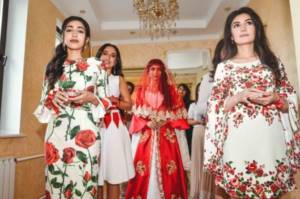
- Strict cut. The bride's dress should not have revealing cutouts. Brides often choose dresses with long sleeves and covered chests.
- National elements. Many girls choose traditional outfits as a wedding dress, which always include the color red. However, some brides choose classic white dresses: the bride’s wedding dress is decorated with gold threads and stones, and a red ribbon is tied to the waist.
- Luxury. As a rule, the bride's outfit, as well as her hair and makeup, look bright enough so that the bride can amaze the groom and all the guests with her beauty.
Wedding portal Svadbaholik.ru. told you a lot of interesting things about the Azerbaijani wedding, as well as its traditions and customs. The culture of Azerbaijan is original and amazing, and weddings in this country are a celebration woven from numerous rituals that promise the newlyweds a happy life.
Wedding gifts and dowry
An Azerbaijani bride accepts gifts from her betrothed throughout the entire period from matchmaking to the official wedding. They give her shoes, jewelry, and clothes from him. On one of the national holidays, the hero of the occasion receives an interesting set of gifts - a beautiful dress, a red scarf, jewelry, and also a lamb is brought on a rope, whose horns are painted with henna. Traditionally, all kinds of sweets and fruits are brought on trays. The bride herself is also given henna, and her bridesmaids paint her hands, feet, and dye her hair.
Before the solemn day of an Azerbaijani wedding, the bride’s dowry is brought to the future husband’s house by her male relatives (brother or uncle) - these are her personal belongings and household items. The future mother-in-law gives the carrier a gift. When he leaves the house, the Azerbaijani bride’s friends arrive to arrange the dowry, tidy up, put things in order, and decorate the room. Girls always receive gifts from the mistress of the house.
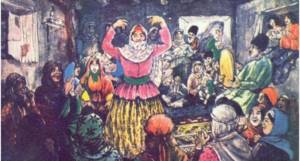
How to prepare for a wedding
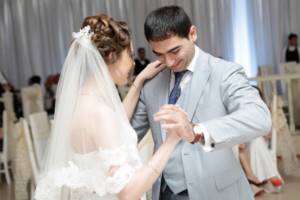
Preparing for an Azerbaijani wedding is a serious matter, because the union of two loving hearts depends on it. Azerbaijani wedding rites stipulate that a pre-wedding conversation between Azerbaijani families should take place before the event. The two male parties choose the date of the celebration and discuss its details: music, menu, number of guests.
During the period from matchmaking to wedding, other Azerbaijani wedding rituals are also held. The tradition of giving gifts to the bride has survived to this day. In the old days, the girl was given wardrobe items from the groom's family, and on one of the holidays the obligatory gift is a red scarf, a richly decorated dress, jewelry and a lamb with horns painted with henna. Here again there are fruits and sweets on trays. In addition, the girl is given henna, which is then used to paint her hands, feet and dye her hair.
Before the wedding, men, relatives of the bride, bring the girl’s personal belongings and her dowry to her groom’s house. The groom's mother gives the carrier a gift. Afterwards, the bride’s friends arrive and put things in order in this house and decorate it. They also receive gifts from the girl's future mother-in-law. A few days before the wedding, the brocade bichini ceremony was also held. The bride's mentor was chosen there. The wedding ceremony in Azerbaijan necessarily included the preparation of bread two or three days before the celebration.
Ceremony "Parcha Bichini"
“Barcha bichini” is translated from Azerbaijani as “cutting clothes.” This event is also held a few days before the wedding. Women on both sides organize a party with dancing and singing. During the ceremony, a bride's mentor is chosen, who will bring the wife to her husband's house, decorate her hands and feet with henna designs, and dress her. As a rule, the mentor was an elderly Azerbaijani woman, with life experience, with children and undivorced, with a good public reputation.
How does matchmaking and engagement work?
It is worth noting that the behavior of the Azerbaijani bride is quite modest; girls try to avoid male companies if possible.
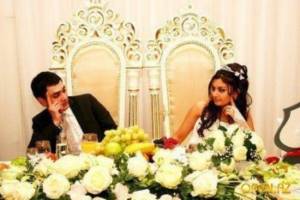
If a guy took a closer look at one of the fair sex, he immediately asked his parents for permission to marry; if they gave their consent, the collection of information about the girl began.
In addition to the external characteristics of the chosen one, relatives and the guy himself are interested in the education of the prospective bride, the position of her family in society, thriftiness and other characteristics. The only thing that is not paid much attention to is the girl’s age. Early marriages in this country are welcomed and considered normal. Parents can marry off their daughter even at 14 years old, and this is quite natural.
According to ancient Azerbaijani customs, matchmaking takes place in two stages.
Three women go to the bride's house for the first time. They tell the girl's parents in detail about the groom's family.
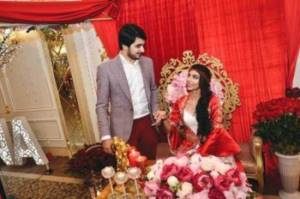
In another case, the parents promise to think carefully about the proposal, and the second meeting already takes place with the presence of the father and other close male relatives of the groom. The first visit has a name - small matchmaking.
With a positive attitude, the bride's parents prepare for the arrival of the matchmakers, set the table, and serve a symbolic aromatic drink. There is an active discussion about the date of the celebration and other issues that are directly related to the wedding. The mother is silent at this time; all important issues are decided by the head of the family.
The girl is staying with her friend all this time; she returns only after the guests leave the house.
It is believed that on this day the future bride should cry - this will bring her happiness in her family life. This is where the big matchmaking ends.

The next stage is engagement or betrothal. Like matchmaking, it has two actions, which are called small and large betrothal. The small engagement lasts for a month, after the bride’s parents agree to the wedding.
The young man’s relatives gather for this in the house of the chosen one. The young bride sits on a chair, surrounded by 30 bridesmaids. One of the groom's relatives must put a ring on the young woman's finger and cover her head with a scarf. Then this person must try at least a small piece of the sweet treat. The rest of the delicacy was to be eaten by the future spouse.
After all the guests have left the house, the traditional “sweet” table for the bachelorette party is set.
Sweets play an important role for the Azerbaijani people, as they symbolize a happy family life and childbirth.
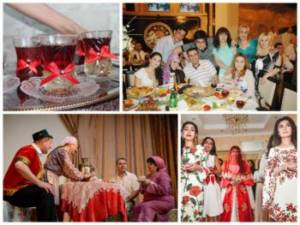
The bachelorette party according to Azerbaijani customs is quite interesting and funny. The bride places her hand one by one on the heads of all the unmarried girls, who, in turn, try on her ring. The one who was lucky enough to be the first to put jewelry on her finger, according to legend, was supposed to be the next to get married.
After a couple of months after the small engagement, the time comes for the big engagement. This process is significantly different from the first because it is larger in scale. A large number of guests are present at the holiday; the girl’s family sets a rich festive table. Products, as a rule, are transferred by relatives of the future spouse.
During the celebration, the groom's relatives received many gifts that were supposed to be useful to the young girl in her family life. Cloth, jewelry and sweets were also given as gifts.
After all the gifts have been received, a wedding ring is put on the girl’s finger.
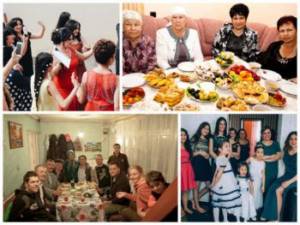
During the feast, the amount of the bride price is agreed upon. As a rule, it was calculated in such a way that it could completely cover all wedding expenses.
Another interesting feature of Azerbaijanis is the conclusion of a wedding contract, which provided for the receipt of monetary profit for the bride in the event that the betrothed wants to divorce her. The period between the engagement and the wedding itself lasted from 3–4 months to several years. During this wait, the groom's family sent gifts for the future relative. When the betrothal period came to an end, relatives gathered around the bride and congratulated her on her upcoming wedding.
Immediately before the celebration, or rather a few days before it, the bride’s family begins to send gifts to the groom and his close relatives.
Making bread
Many Azerbaijani traditions are closely related to bread, because it is a symbol of abundance, prosperity and fertility. For example, before leaving her father’s house, an Azerbaijani bride had to walk around the baked bread three times so that this family would be prosperous without her. Also, in order to protect her future relatives from evil spirits and ensure abundance, the girl took a piece of bread from her parents’ nest to her future home.
Preparing bread for the upcoming wedding is a traditional custom of Azerbaijani families, carried out 2-3 days before the event.
- First, they choose the house where the bread will be baked - at the bride or groom's house.
- Then they try to make good dough, roll it out, and bake pita bread.
- When the treat is baked, the women thank the mistress of the house for the space provided, wishing them wealth and always hot bread on the table.

Wedding preparations
The preparatory process for a wedding requires significant effort from both parties. On the eve of the holiday, relatives meet to discuss all the nuances of the celebration, from the number of guests to the musical accompaniment.
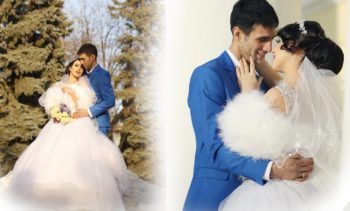
Before the official wedding day, personal belongings of his future wife and dowry are brought to the groom's house. This is done by the men on the bride’s side, and they are given gifts for this.
Next, the bridesmaids come to the groom’s house, arrange and put the dowry in its place, clean the room and decorate it. For this, the future mother-in-law gives the girls gifts. A few days before the wedding, women from both sides hold festivities, which are accompanied by songs and dances.
On this day, a so-called mentor for the bride is chosen. As a rule, this role goes to a middle-aged woman who already has good experience in family life. The mentor will help the girl get dressed, decorate her hands with henna designs and lead the newlywed to the groom's house.
Azerbaijanis do not forget about the main symbol of prosperity and longevity - bread. It was prepared several days before the wedding.
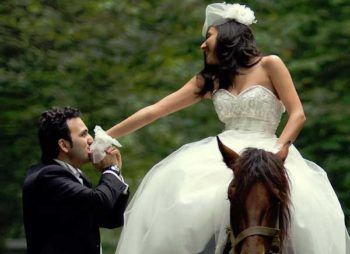
Bread can be baked both in the bride's and groom's houses. After this, the dough is prepared, the pita bread is rolled out and baked. As noted earlier, Azerbaijanis have a tradition of concluding a wedding contract, called mahr.
The amount is agreed upon before the wedding and recorded in the official prenuptial agreement. In the event of a divorce initiated by the husband, the wife receives financial compensation from him. If the spouse herself wants to start divorce proceedings, then in the end she will not get anything, even what she acquired together. A special decoration called “shah” is very important for the bride. This is a wooden element that includes a mirror, fabrics, candles, sweets and fruits.
The bride's best friend made this decoration with her own hands. Celebrations were held at the house of the friend who made the check. In the evening, the groom and his friends come and take the “shah”.
Seeing off the bride
Seeing off an Azerbaijani bride is an ancient wedding tradition. Farewell is full of beautiful symbolism. First, people from the groom’s side come to pick up the Azerbaijani bride, they dance and sing. The bride waits in the wings behind a closed door, the key to which the guests will receive after presenting the gift. After the gift, the parents bless the Azerbaijani girl, tie a red ribbon around her waist, throw a veil over her head and take her out into the yard where a large fire is lit.
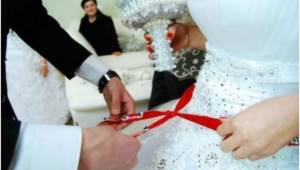
- The Azerbaijani bride is led around the fire three times - this promises light and warmth to the future home.
- They throw a pebble after her so that the walls of this house are strong.
- Then they pour a few drops of water under her feet so that the girl does not feel sad or grieve.
- A plate is placed at the threshold of a new house, which the Azerbaijani bride must break with her foot.
- The girl is given a little boy in her arms so that her first-born child will be a male child.
- Afterwards, a ram is killed in front of the Azerbaijani bride, and the blood is smeared on her forehead and dress - this will help the wife come to an agreement with her new relatives and quickly become a real part of the family.
- The mother-in-law strokes her daughter-in-law's hair so that mutual respect always reigns between them.
- Afterwards, the girl’s head is sprinkled with sweets and rice - for abundance.
- Then the bride is taken to a prepared room, decorated with various decorations, where she receives wishes for happiness, health, and the speedy birth of offspring.

As a rule, along the entire route to the husband’s house, the Azerbaijani guests carrying the bride were blocked in every possible way by the girlfriends, brothers, sisters, and neighbors of the hero of the occasion, asking for a small ransom - sweets or money - to pass.
Wedding in two houses
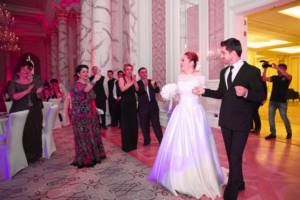
The Azerbaijani wedding begins in the bride's house. At noon the sounds of zurna were heard, they announced the beginning of the celebration. Young people gathered to help serve the guests. Guests brought gifts and money. Before serving any food, a relative of the future husband had to put money on the cauldron. Only after this could the cauldron be opened. Only relatives of the groom have the right to dance with the bride. Around five in the evening, the groom's relatives leave this house, and the holiday continues without them.
After the celebration in the bride's house, an Azerbaijani wedding is held in the groom's house. While the house is being decorated and the table is being prepared, the groom and his relatives go to pick up the bride. The parents of the future husband do not participate in this - they stay at home. Those who came for the girl are waiting at her door. The groom and the driver are sitting in the car, waiting for the girl’s mother to give a gift to those waiting. After this he joins his relatives.
Each of the bride's relatives kisses her goodbye. The daughter receives her last parting words from her father, who kisses her on the forehead. The mother, in turn, blesses the girl. After this, the couple goes to the groom's house. The car in which the bride is sitting is driving ahead. She is followed by other cars that can light torches, overtake each other on the road and even shoot with rifles. Such a noisy motorcade attracts a lot of attention.
Before arriving at the house, the bride takes off one shoe. This shoe is shown to fathers-in-law, announcing the approach of the bride. When the cortege arrives, a ram is slaughtered and a drop of its blood is applied to the foreheads of the newlyweds by the groom's mother. Then the groom sprinkles rice, sugar, coins, sweets and sweet cakes on the bride's head. Walking into the room, the bride cannot immediately sit down. She is allowed to do this only after she receives a gift from her mother-in-law or a promise that she will buy it for her. The fun itself is spent in the courtyard of the house. Guests from the bride’s side arrive there around six in the evening. The bride's parents are present at the celebration for a short time.
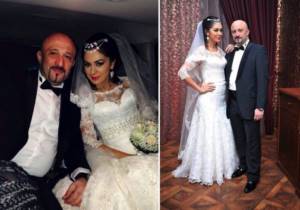
Bride's outfit and hairstyle
What should a bride wear to an Azerbaijani wedding? This could be a traditional costume, which is a long dress with closed arms. This national outfit is richly embroidered with gold thread and decorated with stones. Today, many brides follow fashion and choose white dresses. In the girl's image, the main details are a lace veil and a red ribbon on the belt.
Azerbaijani wedding hairstyles for the bride and for other women who will be present at the celebration are distinguished by their beauty. And it’s not surprising, because Caucasian girls naturally have thick, dark and shiny hair. The master’s task is to highlight the beauty of the hair. It also happens that a girl’s hair is completely hidden under her headdress. But even in this case, the appearance of the bride or guest is magnificent and original.
music and dancing
A wedding in Azerbaijan is always a beautiful event. What makes it so is not only centuries-old traditions and rituals, but also dances. National music is played during the celebration. Rich families try to invite musicians who play folk instruments. Many of those present have known Azerbaijani dances since childhood and enjoy moving to familiar tunes. A large part of the wedding is the music program. The songs sound until the morning, even if an Azerbaijani wedding is taking place in Russia.
Bride coming out
After the newlywed gets into a new home, she should not see her father-in-law for two weeks after the wedding. When the required amount of time has elapsed, the mother-in-law sets the ceremonial table, laden with national dishes and sweets, and the husband’s father calls the girl and gives her a gift - from then on she is officially accepted by the Azerbaijani family.
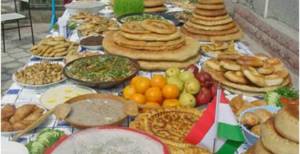
Post-wedding rituals
Many customs take place after the wedding itself. It is accepted that after the first wedding night, the relatives of the husband and wife have the right to look at the sheet to make sure of the girl’s innocence. After this, the owners of the house treat everyone to pilaf. In addition, after the wedding, the mother-in-law brought a variety of dishes to the newlyweds for three days. When a young wife finds herself in a new house, she is not allowed to see her father-in-law for fourteen days. After this time, the mother-in-law sets the festive table, and the father-in-law calls his daughter-in-law and gives her a gift. This is how the new family accepts their son's wife.
A few months after the celebration, the wife’s mother arrives with her family to visit her daughter and her new family. The first visit to parents is also unique. The traditions of newlyweds visiting their parents after the wedding are such that only after forty days can the spouse visit her home with her husband and members of his family. A rich table is set there, after which the girl stays at home for several days. After observing the above-described rituals, the young wife can visit her relatives at any time. The spouses are also invited by close relatives on both sides to exchange news and present gifts to the newlyweds. Nowadays, it is customary to take photographs at a wedding, and the bride and groom can sit at the table with the guests.
Post-wedding visits
When the wedding has taken place, an obligatory series of visits is carried out:
- Visit to my daughter. A few months after the event, the wife’s mother and her family warn her daughter’s new family about her arrival. The guests arrive, the table is set, and after the visit the Azerbaijani newlyweds are given gifts.
- First visit to parents. Only after a period of forty days has passed after the wedding, the wife is allowed to visit the parental home along with her husband and other new relatives. A large Azerbaijani feast is held there, after which the girl stays at home for several days. Then her husband takes her - from now on she can visit her family whenever she wants.
- Visits to relatives. Close relatives on the part of the newly-made Azerbaijani husband and wife invite the newlyweds to visit to dine with them, find out the news, and present a few gifts.
How does the engagement work?
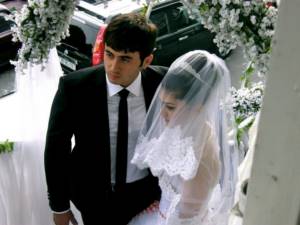
Azerbaijani modern betrothal and betrothal rituals still remain very original. Betrothal, like matchmaking, also has two stages. The small betrothal of Azerbaijani newlyweds takes place after the bride's parents have given their consent to the marriage. As a rule, this happens within a month. The groom's relatives come to the bride's house. The girl herself on this day is surrounded by two or even three dozen friends. One of the messengers puts a ring on the bride's finger and covers her head with a scarf. Afterwards he must eat half of some sweets. The other half of the “dessert” is given to the groom.
When the envoys leave the house, the housewives set a “sweet table”, symbolizing prosperity and happiness in the family. What follows is a kind of bachelorette party: the bride touches the heads of her unmarried girlfriends, and they try on her ring. The first of the friends, according to legend, will soon become a bride herself. It was also customary among Azerbaijani girls to place two identical pieces of sweet pastries under their pillows. This meant that at night they would dream of their betrothed.
The big engagement before the wedding in Azerbaijan takes place a few months after the small one. Everyone is carefully preparing for this holiday. The bride's relatives prepare various dishes for the festive table, but many products can be given to them by the groom's relatives. There are a lot of guests - not only relatives, but also neighbors and friends.
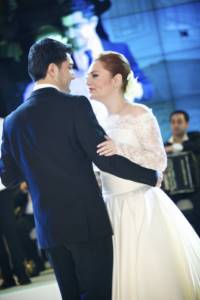
The groom's relatives gave gifts to the bride, giving everything that could be useful, except shoes. Later, her mother-in-law gave her shoes. Large gifts were placed in chests and tied with a red ribbon. Small gifts were laid out on copper trays and covered with colorful cloth. Gifts were often presented to the accompaniment of music. After this, they put a ring on the bride’s finger and sat down at the table to negotiate the size of the ransom. This money was then spent on the wedding and dowry.
In addition to the ransom, families could enter into a prenuptial agreement, according to which the bride was entitled to monetary compensation in the event of a divorce. From engagement to wedding it could take several months or several years. The future bride sat at home, and the groom's family sent her gifts - clothes, household items, fruits, etc. On the festival of sacrifice, the gift was a bull.
After the big engagement, after some time has passed, the bride's family gives gifts. She delivers them to the groom on the same trays on which the bride received the gifts. The first of the gifts is given to the guy himself, the second to the men from his family, and the third to the women. Other trays are filled with fruits and national sweets. Now the tables are set by the other side, but there are fewer guests at this event.
Choosing a betrothed
Choosing a bride, according to Azerbaijani traditions, is a responsible undertaking. In Azerbaijan, by right of the head of the future family, the choice is made by the man. For him, not only the beauty of a potential wife is important, but also the status of “young”, her position, her family in society. The age of your loved one does not particularly influence the choice. Ceremonies with even 15-year-old girls are allowed here.
Azerbaijani girls should be modest, avoid the company of boys, and spend their free time in the company of friends. Despite the fact that today morals in the country have become more free, the modesty and chastity of the newlywed play a paramount role.
After a man has made his choice, he asks his parents for permission to marry. People value the opinions of older family members very much; they usually do not contradict their parents or go against their will. If the parents have given their blessing for the marriage, the groom asks one of his closest relatives to make inquiries about his betrothed. She will have to quickly find out about the financial situation of the chosen one’s family and her status. The relative learns about the health of the chosen one, about her moral upbringing, as well as education. An important fact is how economical the chosen one is, whether she knows how to manage household chores.
The traditional Azerbaijani celebration will only take place if the parents give consent to the marriage. However, if the young man’s financial condition is insufficient, the parents will refuse the matchmakers and the ceremony will not take place. Azerbaijani ceremonies are always magnificent events held with the consent of the families of the newlyweds. Today, not only the wedding itself, but also the ceremonies preceding it are celebrated magnificently in the country; a lot of money is spent on decorations for the betrothed.

Azerbaijani wedding in the bride's house
Today, in accordance with current legislation, marriage requires state registration; previously, the union was confirmed exclusively by the Mullah. An Azerbaijani wedding begins at the bride's house. The start of the wedding is announced by the sounds of the zurna, which are heard around 12 o'clock in the morning. All the young people gather to help serve the guests who have already started the feast. Guests come with gifts on trays or with money in envelopes. Before serving food on one of the cauldrons, the groom’s relative puts money, only then can it be opened. Only relatives of the groom can dance with the bride. Neither bridesmaids nor men can dance with her. Closer to five o'clock in the evening, the guests from the groom's side leave, but the celebration continues in the bride's house.
Azerbaijani weddings
Choosing a future bride
Marriage is considered the greatest happiness for Azerbaijani girls, so from childhood they are taught that they need to be modest and chaste. To avoid unnecessary dangers such as kissing under the moon and walking hand in hand with their first love, daughters are raised strictly, forced to communicate only with girls and avoid any contact with men. Even today, when problems with communication simply do not exist thanks to the Internet, in Azerbaijan a man chooses his own bride, since young girls do not communicate with strangers and even have virtually no contact with the groom before the wedding.
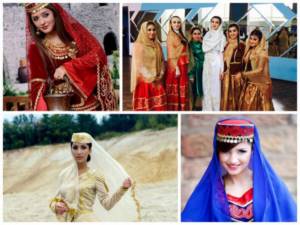
Having chosen a worthy candidate, the young man does not consult with his parents, but immediately asks for their permission and blessing. Most families support their children. If they are against the bride, the guy is most often forced to change his decision, because the authority of the parents cannot be doubted.
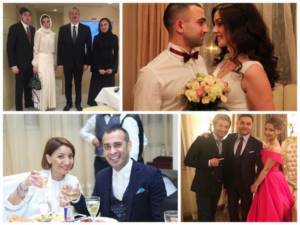
The next stage is called “message”. The groom is looking for a reliable intermediary who must obtain information about the appearance, health, education and personal qualities of the chosen one, financial and social status, as well as the reputation of her family in society. In addition, the matchmaker must find out whether this groom is suitable for the chosen girl, since the parents will not give up their daughter for a man who cannot provide his future wife with at least the same standard of living and will refuse the matchmakers. But the age of an Azerbaijani girl is rarely taken into account. For Muslims, a 14-15 year old girl is considered a full-fledged bride.
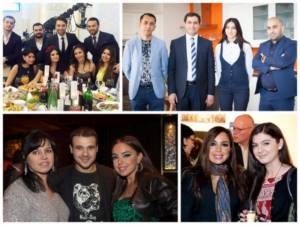
If at this stage everything goes well for the groom, his family sends a matchmaker to the parents of his chosen one to inform them of the young man’s intentions and, with the latter’s consent, to negotiate a date for the official matchmaking.
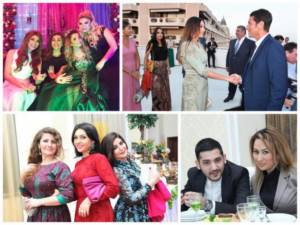
Matchmaking
Azerbaijani matchmaking is divided into two parts:
- Small matchmaking.
- Big matchmaking.
At the stage of small matchmaking, the young man’s father discusses the issue of his son’s marriage with relatives, and every judgment of the relatives is evaluated. Having decided this in their circle, the boy’s family sends matchmakers to the girl’s parents. First, women come to visit: the young man’s mother and aunt, his older sister or grandmother, since Azerbaijanis are sure that only the mother can understand what the bride’s heart will say.
The women discuss the details, and then it’s time for the fathers of the families to meet. The young man's father and three other relatives or men revered in this settlement come to the bride's house to once again declare the groom's desire. But her parents do not give an answer right away, but say that they need to find out about their girl’s intentions. If she agrees, she must remain modestly silent and not answer questions about the future wedding. The matchmakers leave and await an official decision, which is announced at the next stage.
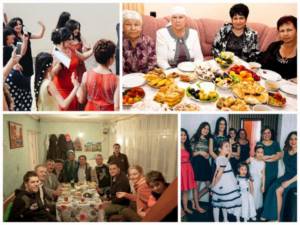
After this, the groom's parents again invite their relatives to talk about the wedding. At the same time, women go to the bride so that she expresses her proposals regarding the celebration and decides with them when the big matchmaking will take place.
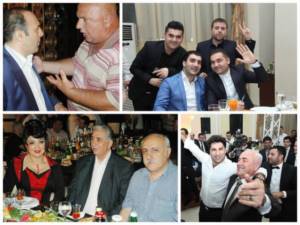
Not only the groom's envoys, but also the bride's relatives are invited to the ceremony of the last part of the matchmaking. However, the newlywed and her mother are not present at the celebration; they leave home at this time so as not to hear the men’s conversations. Representatives of the stronger sex first discuss local news, as well as other things far from the purpose of the visit. And at the very end, the main question is asked whether the parents will give their beautiful daughter to their son or not. If the girl’s family decides that the guy is not suitable for her, they refuse, softening their decision as much as possible. If the relatives and the bride agree, then they also do not talk about this directly, but ask for time to make a decision, which means that the matchmakers will need to come again.
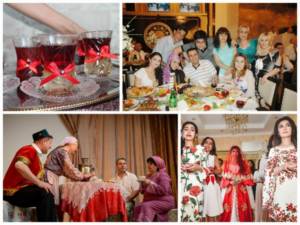
For the second visit of the matchmakers, the table is set again and the guests are invited. The mother of the bride is already allowed to the feast, but she is not allowed to say anything, she must listen and look closely at the matchmakers. After talking about everyday topics, the matchmakers again ask a sacred question, asking what the bride’s father will say. As a rule, the parent no longer refuses, but gives his consent, saying: “May Allah protect the young!”
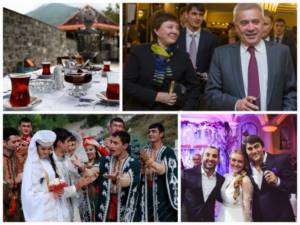
Finally, the matchmakers are brought strong tea, fruits and baked sweets, and the bride’s sister runs to congratulate her relative on the matchmaking, since she has been staying with her friend all this time. Only after the guests have gone home will the girl be able to return home, where everyone congratulates her on her imminent marriage, rejoices and cries.
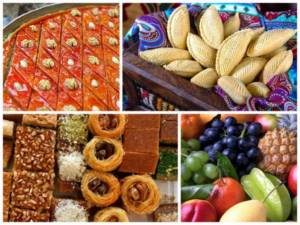
Small and large engagement
Betrothal in Azerbaijan also takes place in several stages.
After consent to the wedding has been received from the girl’s family, a small engagement lasting a month is held. So, the young man’s close relatives come to the bride’s house, where his chosen one sits surrounded by unmarried girlfriends. One of the matchmakers approaches her, puts on a ring and a scarf, and also chooses a sweet and bites off a small piece of it, and takes the rest to the groom as a gift from his betrothed. After they leave, a table is set in the newlywed’s house for the guests, bridesmaids and the bride herself, and after the feast a magnificent bachelorette party begins.
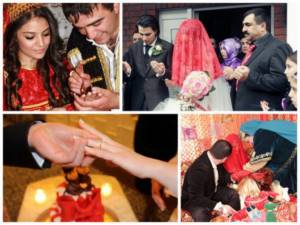
Interestingly, sweets are present during all rituals and stages of an Azerbaijani wedding. In the culture of this people they mean fertility, wealth and abundance. What more could a young family wish for?

Previously, the bachelorette party was no less interesting than the engagement itself, and a mandatory ceremony was performed at it. During it, the bride had to go up to each unmarried bridesmaid and put her hand on her head, holding the girl while she tried on her ring. It was believed that the young woman to whom it suited first would soon have her own wedding. The girlfriends also took a couple of sweets from the table to put them under the pillow at night and see their betrothed in a dream.
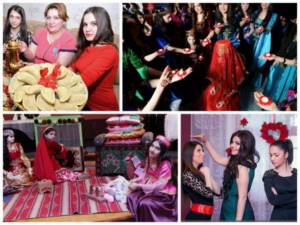
The second part, the big Azerbaijani betrothal, is being organized in a few months. This is a real holiday for which both families carefully prepare. The decoration of the festive table is entrusted to the bride's relatives, although often many products, such as sweets, flour, meat and wine, are purchased by the groom's relatives. Not only close, but also distant relatives, as well as closest neighbors are invited to the holiday, since it is not so much the personal relationships of the newlyweds that are of great importance, but the fact of how the wedding will be viewed in the immediate community.
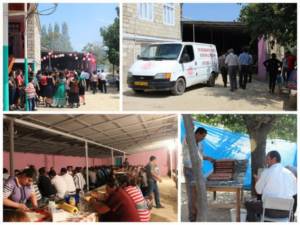
Previously, the presence of respected people at all stages of the celebration was considered a necessary condition for organizing special events, since, according to beliefs, showing respect for them would make the marriage extremely strong. In addition, those present could put in a word for the young family in front of community members.

During the big engagement, all the groom's relatives and friends gave gifts to the bride as a guarantee of her future happy and rich life. At the same time, it was forbidden to present shoes, since the shoes were brought to the girl by her future mother-in-law.
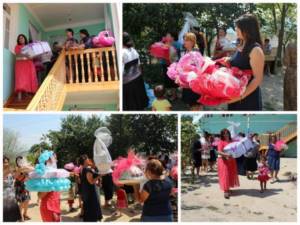
Presents were placed in chests tied with scarlet ribbons, and small souvenirs were placed on trays made of copper and decorated with bedspreads made of expensive fabric specially prepared for the celebration. Khoncha was the name of the trays that were passed down from generation to generation or were made to order. They were a mandatory attribute of many Azerbaijani wedding ceremonies. Sometimes they do not forget to use khoncha even today, paying tribute to traditions.
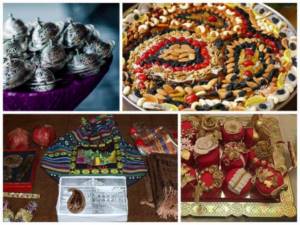
Some families hired musicians who accompanied the presentation of gifts with music and songs. Usually the Azerbaijani bride was brought:
- Sweets.
- Household items that were used to decorate the home of the newlyweds.
- Bracelets, earrings, rings and other jewelry.
- Pieces of patterned fabric.
- Colored bedspreads and scarves.
As a rule, the newlywed did not use such gifts before the wedding, but put them together so that they formed part of her dowry.
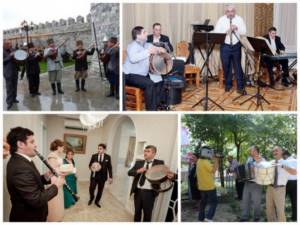
Then the girl was again given a ring, which played the role of an engagement ring, after which all the relatives sat down at the table to discuss the issues of the wedding and the bride's ransom. Its amount depended on a number of factors: the girl’s financial situation, her moral qualities, and society’s attitude towards the family. Usually the money from the ransom was used to pay wedding expenses and buy a dowry. In addition, an agreement was signed guaranteeing the girl financial compensation in the event of a divorce. Well, after the end of the ceremony, the family congratulated the future bride and looked at the gifts together.
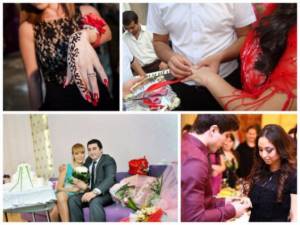
A certain amount of time had to pass between the big engagement and the wedding. In some cases it was months, and sometimes even years. The girl lived with her parents, but the groom’s family did not leave her without participation and material support, sending her clothes, home accessories, jewelry, sweets and fruits. Not only the groom's family had to show generosity - the bride's relatives also had to send gifts to their future relatives on already familiar copper trays. The first tray was intended for the groom himself, on the second were gifts for the male half of his family, and on the third were gifts for all the women of the house. The remaining trays were filled with sweets and fruits.
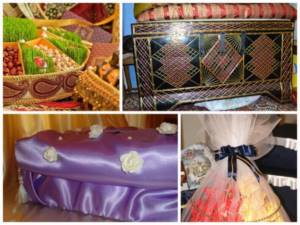
On the day of presenting these gifts, the groom's family set the table for a small family meal. During it, the matchmaker had to tell who this or that tray was intended for, and the mother of the future husband had to thank her and the girl’s family for the gifts.
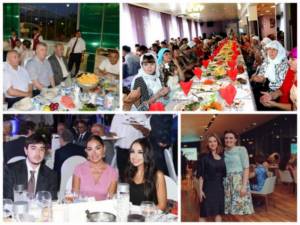
Pre-wedding chores
An Azerbaijani wedding is a big holiday that unites not only the lives of two people, but two families who become family. Therefore, all relatives without exception participate in the celebrations. The list of obligatory events includes a conversation arranged by the young man’s father. During it, the relatives of both young people negotiate the wedding day, choosing the most favorable date, decide on the ceremony, the number of guests, the festive table menu, music and calculate the financial costs associated with organizing the wedding.
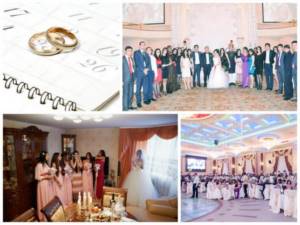
As a rule, all expenses are borne by the young man's family, but often, wanting to demonstrate their wealth, the bride's relatives place the financial burden on their shoulders. The conversation ends with both parties agreeing on all issues, and then the future relatives, wishing each other the best, go their separate ways.
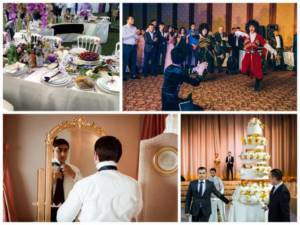
Wedding gifts and dowry
The groom and his family give gifts to the bride for a long period, until the wedding celebration. In addition, there is a tradition of presenting her with a dress, accessories in the national style, a red scarf, henna for one of the holidays, and also bringing a young lamb with painted horns, which is slaughtered for treating the guests. Then the girl given henna is painted on her feet and hands, asking Allah to give her a happy family life.

Before the wedding, the bride's dowry is transported to her future home, and the mother-in-law always gives the carrier a present. And then the bridesmaids come to visit, clean and decorate the newlyweds’ room, prepare their marriage bed and arrange the dowry in its place, for which they also receive small gifts.
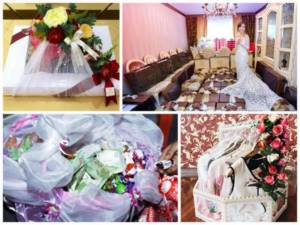
Ceremony "Parcha Bichini"
Translated from Azerbaijani, the phrase “brocade bichini” means the cut of clothing, although this ritual uses a slightly different context. This ritual is performed before the wedding by adult women, whose task is to choose a good mentor for the bride. Her role boils down to bringing the girl to the new house, washing and painting her legs and arms, putting on an outfit, and also talking about the duties of a young wife. An elderly woman who has experience communicating with children and has a reputation as a wise and decent wife and mother is chosen as a mentor.
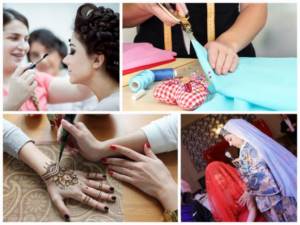
Making bread
As in many other cultures, bread has always been valued in Azerbaijan, which is a symbol of wealth, prosperity and abundance. Without fail, the bride, before leaving her father’s house, walks around the freshly baked bread three times, so that her family will live prosperously when she is no longer with them. To protect her future family from Satan and give her abundance, the girl must take the bread baked by her mother.
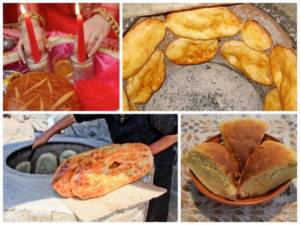
Previously, they always baked bread for a wedding, a couple of days before the ceremony. They cooked it in one of the houses, and then left, thanking the hostess for allowing them to bake lavash in her house.
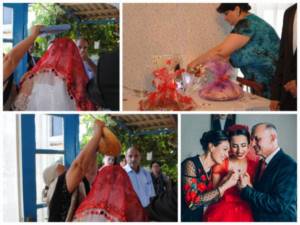
Mahr (ransom)
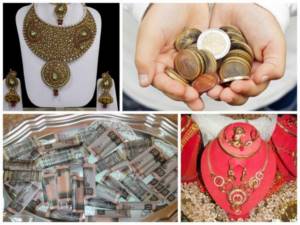
Mahrom is the name given to money and material assets that are carefully saved and must, by law, become the property of the wife upon divorce or the death of her husband. In this way, the girl will be able to secure a future for herself and her children.
If the woman herself decides to leave her husband, then she does not have the right to take even part of the common property, as well as gifts given for the wedding. In this case, the children remain with the abandoned husband.
Seeing off the bride
Farewell is an ancient and highly respected tradition in Azerbaijan. First, guests from the future husband's side walk in the house of the bride, who waits for their arrival indoors and does not even come out to say hello. After the invitees give the parents a generous gift, they finally bless the daughter, gird her with a red sash, throw a veil over her face and lead her into the courtyard, where they circle her three times around the lit ritual fire. Then they throw a stone after her so that her father’s house does not fall apart without her, and they pour water under her feet, believing that this way the girl will not cry about her abandoned shelter.
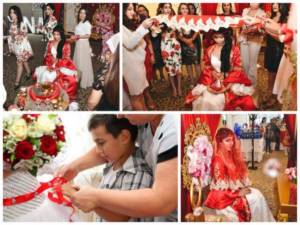
Near the new house, the bride must break the prepared plate and take the boy in her arms to give birth to her first-born son. In her honor, guests slaughter a young ram, whose blood is smeared on the girl’s forehead and outfit. Such a ritual should help her become part of the new family, and during it, the mother-in-law strokes the girl’s hair as a sign of mutual respect. Then the betrothed is sprinkled with rice and small sweets and taken to a room decorated by her friends, where she will receive congratulations. During each action, the bridesmaids must hover under the feet of those present to receive a small gift for the newlywed as a ransom.
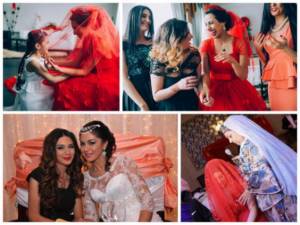
"Shah" of the bride
Without fail, a friend makes a shah for the bride with her own hands - a wooden decoration to which a fragment of a mirror, pieces of a candle, fabric, fruit and sweets are added. When the Shah is ready, the girlfriend's parents set the table in anticipation of the young groom with his unmarried friends. He takes the jewelry and takes it to his bride, and on the way his friends shoot guns, have fun and sing. The bride always wears a shah at her wedding so that her future family can live in abundance.
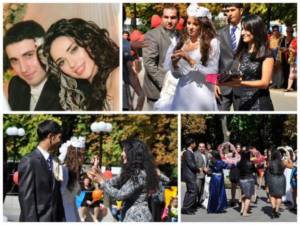
Azerbaijani dances at weddings
During an Azerbaijani wedding, musicians who play traditional musical instruments are always called upon. During events, invited guests periodically begin to dance fiery folk dances and sing. This is part of the holiday, without which the wedding is considered incomplete.
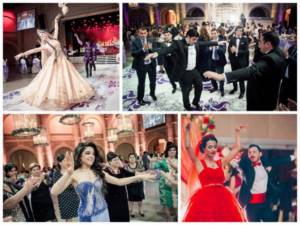
Post-wedding traditions
Most Azerbaijani traditions cover the period after the wedding. So, for example, the first wedding night ends with the arrival of the young relatives who want to inspect the sheet, which serves as proof of the innocence and honesty of the young wife. If virginity is proven, everyone goes to eat pilaf, and the young remain in their chambers. They spend three days there, getting to know each other and trying to conceive an heir. During this period, the mother of the young wife has the right to come to her house and bring the newlyweds various dishes to strengthen their strength.
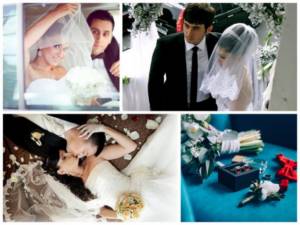
Bride coming out
Once in her husband's house, the newlywed should not see her father-in-law for two weeks. Therefore, on the day of their meeting, the mother-in-law sets a small table with national food, and the father-in-law personally calls his new daughter to the table and presents her with a small souvenir. Thus, the daughter-in-law officially becomes part of the new Azerbaijani family.
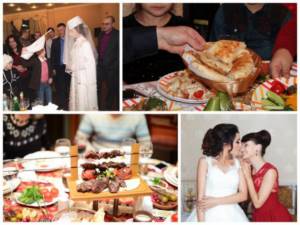
Post-wedding visits
After the end of the wedding celebrations and the first days of rubbing in, a number of mandatory visits are carried out:
- The arrival of a mother to her married daughter. Some time after the wedding, the mother-in-law and her relatives come to their daughter’s house. When they arrive, the newlyweds set the table and receive gifts from their wife’s relatives who have come.
- A trip to the bride's parents. Forty days after the first wedding night, the young wife must visit her father’s nest with her husband. There, tables are waiting for them, and after the party, the wife stays with her parents for a couple of days, after which her young husband takes her home. Now she is allowed to come to her parents’ home at any time.
- Visiting relatives. In the post-wedding period, newlyweds are actively invited to visit by relatives on both sides to present gifts to the new family. Of course, such a visit is mandatory.
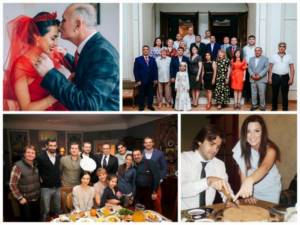
An Azerbaijani wedding is a bright and unforgettable event, held in accordance with ancient customs and ancient rituals. Such a holiday definitely arouses interest and admiration for everyone who has the honor of attending it.
